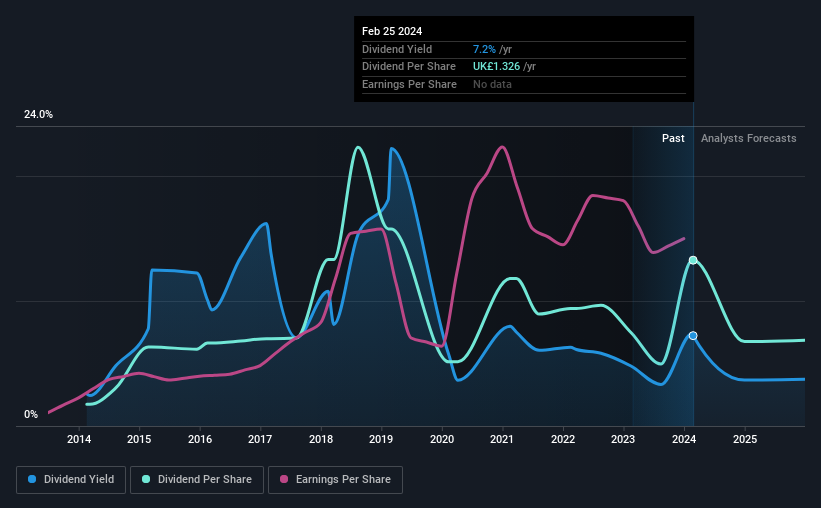
It looks like Plus500 Ltd. (LON:PLUS) is about to go ex-dividend in the next 3 days. The ex-dividend date occurs one day before the record date which is the day on which shareholders need to be on the company's books in order to receive a dividend. The ex-dividend date is an important date to be aware of as any purchase of the stock made on or after this date might mean a late settlement that doesn't show on the record date. Meaning, you will need to purchase Plus500's shares before the 29th of February to receive the dividend, which will be paid on the 11th of July.
The company's next dividend payment will be US$0.9462 per share, on the back of last year when the company paid a total of US$1.68 to shareholders. Looking at the last 12 months of distributions, Plus500 has a trailing yield of approximately 7.2% on its current stock price of UK£18.35. Dividends are an important source of income to many shareholders, but the health of the business is crucial to maintaining those dividends. As a result, readers should always check whether Plus500 has been able to grow its dividends, or if the dividend might be cut.
View our latest analysis for Plus500
Dividends are usually paid out of company profits, so if a company pays out more than it earned then its dividend is usually at greater risk of being cut. Plus500 paid out a comfortable 25% of its profit last year.
Generally speaking, the lower a company's payout ratios, the more resilient its dividend usually is.
Click here to see the company's payout ratio, plus analyst estimates of its future dividends.

Have Earnings And Dividends Been Growing?
Stocks with flat earnings can still be attractive dividend payers, but it is important to be more conservative with your approach and demand a greater margin for safety when it comes to dividend sustainability. If business enters a downturn and the dividend is cut, the company could see its value fall precipitously. With that in mind, we're not enthused to see that Plus500's earnings per share have remained effectively flat over the past five years. We'd take that over an earnings decline any day, but in the long run, the best dividend stocks all grow their earnings per share.
The main way most investors will assess a company's dividend prospects is by checking the historical rate of dividend growth. Plus500 has delivered an average of 23% per year annual increase in its dividend, based on the past 10 years of dividend payments.
Final Takeaway
From a dividend perspective, should investors buy or avoid Plus500? Earnings per share have been flat in recent years, although Plus500 reinvests more than half its earnings in the business, which could suggest there are some growth projects that have not yet reached fruition. Plus500 ticks a lot of boxes for us from a dividend perspective, and we think these characteristics should mark the company as deserving of further attention.
With that in mind, a critical part of thorough stock research is being aware of any risks that stock currently faces. Our analysis shows 2 warning signs for Plus500 that we strongly recommend you have a look at before investing in the company.
Generally, we wouldn't recommend just buying the first dividend stock you see. Here's a curated list of interesting stocks that are strong dividend payers.
New: Manage All Your Stock Portfolios in One Place
We've created the ultimate portfolio companion for stock investors, and it's free.
• Connect an unlimited number of Portfolios and see your total in one currency
• Be alerted to new Warning Signs or Risks via email or mobile
• Track the Fair Value of your stocks
Have feedback on this article? Concerned about the content? Get in touch with us directly. Alternatively, email editorial-team (at) simplywallst.com.
This article by Simply Wall St is general in nature. We provide commentary based on historical data and analyst forecasts only using an unbiased methodology and our articles are not intended to be financial advice. It does not constitute a recommendation to buy or sell any stock, and does not take account of your objectives, or your financial situation. We aim to bring you long-term focused analysis driven by fundamental data. Note that our analysis may not factor in the latest price-sensitive company announcements or qualitative material. Simply Wall St has no position in any stocks mentioned.
About LSE:PLUS
Plus500
A fintech company, operates technology-based trading platforms in Europe, the United Kingdom, Australia, and internationally.
Flawless balance sheet, undervalued and pays a dividend.
Similar Companies
Market Insights
Community Narratives




